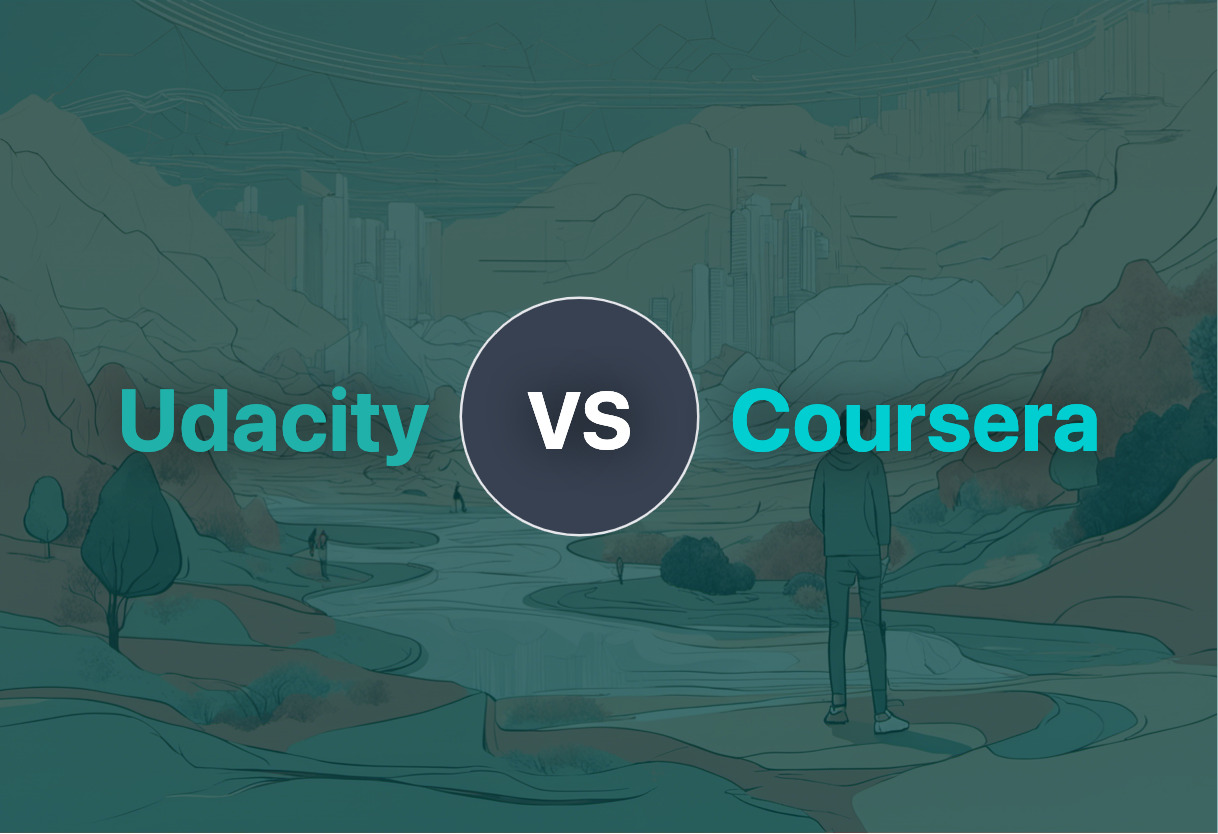Choose Coursera for a vast range of academic and professional development courses with university and corporate partnerships. Best-suited for broader learning needs. However, for an intensive, job-specific learning experience, especially in tech space, choose Udacity’s Nanodegree programs. They provide project-based learning and real-world applications with personalized mentoring.

Key Differences Between Udacity and Coursera
- Udacity provides project-based learning with real-world applications, Coursera offers a broad range of courses across different disciplines.
- Udacity Nanodegree programs are designed with a focus on specific job skills, primarily in the tech industry. Coursera offers a mix of academic and professional courses with university and corporate partnerships.
- Udacity’s interface offers personalized feedback, industry expert mentors and resumes or CV reviews. Coursera enables users to demonstrate mastery through certificates, degrees, and MasterTracks.
- Udacity is valued at over $1 billion and partners with tech giants like Google. Coursera, with a student base of over 53 million, has partnerships with more than 190 universities and companies.
| Comparison | Udacity | Coursera |
|---|---|---|
| Type of Organization | For-profit | For-profit |
| Courses Offered | Open big online, project-based | Free and paid, catered to various fields |
| Course Creation | With leading tech firms | Partners with universities & companies |
| Industry Usage | Aerospace, Automotive, Financial Services, Energy, Telecom, Healthcare, Technology | Business, Education, Enterprise, Government, Technology |
| Nanodegree/Certificate Programs | Yes, starts at $399/month | Yes, cost varies |
| User Interface | User-friendly, quick registration | User-friendly, single sign-on |
| Revenue and User Count | $100 Million (2018), 1.6 Million users (2014) | Undisclosed |
| Core Teaching Method | Graded projects | Self-paced courses, robust tracking & reporting |
| Company Valuation | Over $1 billion | Undisclosed |
| Presence of LMS | Yes | Yes |
| Employability | Job-specific skill training, recognized certificates | Job-specific courses, industry certification algorithm |
What Is Udacity and Who’s It For?
Udacity is an American for-profit educational organization that offers massive open online courses (MOOC) to over 17 million learners. Founders Sebastian Thrun, David Stavens, and Mike Sokolsky designed this project-based learning platform in collaboration with the world’s most innovative tech companies. With diverse courses in areas like machine learning, data science, artificial intelligence, robotics, and marketing, Udacity has carved its niche in the cloud-based e-learning system. It’s intended for professionals and students seeking skill-specific training in various domains.

Pros of Udacity
- Offers Nanodegree programs taught by industry experts.
- Highly practical, with open-ended projects modeled after real-world workplace scenarios.
- Offers personalized feedback and has industry-expert mentors.
- Provides career coaching, resume/CV, LinkedIn, GitHub reviews.
Cons of Udacity
- Udacity’s courses and Nanodegree programs require a longer time commitment compared to other platforms.
- Nanodegree programs can be costly, starting at $399 per month.
What Is Coursera and Who’s It For?
Founded by two Stanford professors in 2012, Coursera is an online content library and learning platform that provides both free and paid courses. It caters to over 53 million students and has partnered with more than 190 universities and companies to offer a vast range of courses. Whether it’s arts, business, computer/data science, languages, or personal development, Coursera has become an effective tool for upskilling staff. Serving at large in business, enterprise, government, and technology sectors, Coursera meets the extensive demands of students as well as professionals.

Pros of Coursera
- Offers certification tracking, e-learning, customizable assignments ,and supports plagiarism control for effective learning.
- High quality university-partnered self-paced study units for earning industry-relevant credits.
- Mobile-friendly for learning on the go.
- Wide cross-section of courses available from arts to engineering.
Cons of Coursera
- While some courses are free, others may be quite costly, limiting availability for some students.
- Some learners may find the platform’s broad focus overwhelming compared to services that focus more narrowly on specific skills or industries.
Udacity vs Coursera: The Final Call
After judiciously surveying both platforms, it’s time to yield a determination tuned to specific audience segments. Let’s dive in.
Professionals Seeking Job-Specific Skills
For this group, Udacity emerges victorious. With its project-based learning coupled with industry-expert mentorships, Udacity provides real-world scenarios helping professionals acquire desirable skills.

Businesses Looking for Upskilling Programs
Coursera, with its customized learning paths and wide-ranging course library, is an optimal pick. It holds the potential for immense time and cost savings.

Learners Eyeing Long-term Credentials
Should you desire more durable credentials, Udacity’s Nanodegree programs have a persuading edge. They demand longer commitment, but the rewards are hard to dismiss.

Students and Casual Learners
Coursera’s robust course selection, cheaper courses, and university partnerships make it a more fitting choice for students and hobby learners.

In conclusion, Udacity, with its audacious real-world pedagogy, rules for career climbers and Nanodegree aspirants. Conversely, Coursera shines for businesses, casual learners, and those in pursuit of cost-effective credentialing.
Grant Sullivan
Content writer @ Aircada and self proclaimed board game strategist by day, AI developer by night.





